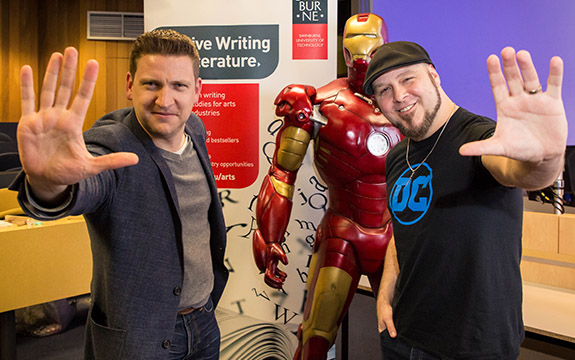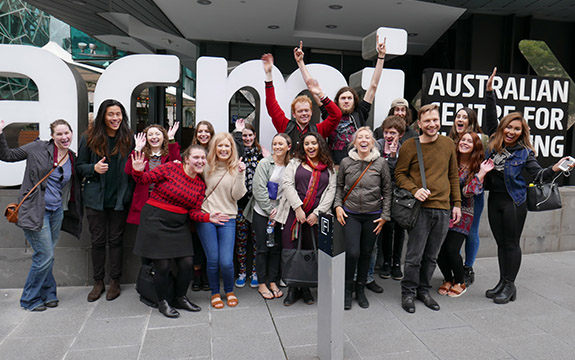Swinburne’s superhero expert Dr Liam Burke

In Summary
- Dr Liam Burke is Swinburne’s resident superhero expert
- Has been involved organising Cleverman: The Exhibition at ACMI
- Exploring fan culture and why superheroes illicit such strong reactions
Swinburne’s resident superhero expert, Dr Liam Burke, has been as busy as the Marvel Cinematic Universe (MCU) the past year. But, instead of snapping his fingers and halving his workload, he’s been expanding his focus, exploring the story of Australia’s first Indigenous superhero television series.
The cinema and screen studies lecturer has been involved in organising Cleverman: The Exhibition at the Australian Centre for the Moving Image (ACMI). The exhibit explores First Nations storytelling, language and creativity in production design, costumes and props, and invites visitors to immerse themselves in a powerful origin story.
“Cleverman represents a particularly inventive use of the superhero genre to engage with a range of socio-political issues, in particular, the hardships faced by Australia’s first peoples,” says Dr Burke.
Beyond the screen
Looking towards more mainstream outputs such as Black Panther and Captain Marvel, Dr Burke says of superhero films: “They’re the Westerns of our day. It’s a trend that surely cannot last forever, but with two decades of unbroken dominance in cinema, they’re worthy of our attention.”
In late 2018, Liam ran the Superheroes Beyond conference at ACMI. More than 50 leading Australian and international scholars attended and gave their attention to everything superhero-related, from cosplay to real-life superheroes and the ethics of comic-book escapades.
“The conference was designed to go beyond outdated definitions of superheroes,” he says.
“During three days of panels and talks, experts from around the world unmasked international examples, examined superheroes beyond the comic book page, and considered real-world examples of superheroism. We had a range of leading comic book creators participate, including the first woman ever to draw Wonder Woman, Trina Robbins“

Dr Burke's students have had the chance to take part in events at MonsterFest, Oz Comic Con and ACMI.
Working with his Swinburne colleague Professor Angela Ndalianis, Dr Burke has also been exploring superheroes using virtual reality technology. Superheroes: Realities Collide gave visitors to ACMI the chance to create their own unique superhero character using the power of virtual reality.
Understanding fandom
A big part of Dr Burke’s work is asking the question: “why do fans connect so strongly with superheroes?”
This question is being investigated by Dr Burke and his fellow academics in a research project, Superheroes and Me, which has been funded by the Australian Research Council in partnership with ACMI.
“We wanted to draw attention to how superheroes around the world have been reimagined to respond to local cultures, politics, and traditions,” says Dr Burke.
“I’ve been interviewing the people who make up the comic book movie universe: fans at conventions and screenings, legendary figures from DC and Marvel comics, and even the stars of shows such as Doctor Who, Jessica Jones, Smallville, iZombie, Power Rangers, and Cleverman,” he says.
“The role of heroes in culture is not fully understood, but this project aims to understand why they’re so important. If nothing else, it’s about identity.”
Superheroes and Me explores why fans connect so deeply with superheroes.
Swinburne’s own superhero
Back at Swinburne, Dr Burke is proud of the work he’s doing as the cinema and screen studies coordinator.
“Unlike some traditional universities, cinema and screen studies at Swinburne embraces screen in the broadest sense, especially the convergence of screen media. We can’t stay rooted in the idea that cinema is a standalone activity,” he says.
His students have had the chance to volunteer at MonsterFest, Oz Comic Con and even attend guest lectures given by Tom Taylor, one of the world’s leading comic book writers who has written stories for Batman, Spider-Man, and many other heroes.
Dr Burke started out as an academy coordinator at the Irish Film and Television Academy, but he’s now happy to call Swinburne and Melbourne home.
“Melbourne is great, because it has such a vibrant culture that provides so many opportunities. At Swinburne, innovation isn’t just a buzzword. This is a dynamic environment that changes rapidly in response to industry, technology, and student needs.”

